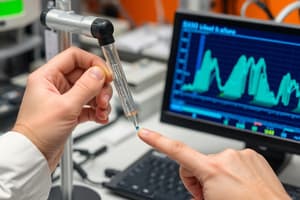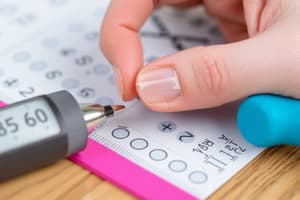Podcast
Questions and Answers
What is the primary purpose of a reliability assessment in testing?
What is the primary purpose of a reliability assessment in testing?
- To evaluate the psychological attributes of an individual.
- To determine the consistency of a test or measurement over time. (correct)
- To derive measurements from other calculations.
- To measure the accuracy of test results against a known standard.
Which of the following best describes accuracy in the context of measurement?
Which of the following best describes accuracy in the context of measurement?
- The exactness of repeated measurements under the same conditions.
- The closeness of a measured value to a standard or known value. (correct)
- The reliability of a test conducted multiple times.
- The ability to replicate results with precision in different settings.
What type of test is designed to identify a specific condition or problem?
What type of test is designed to identify a specific condition or problem?
- Performance Test
- Psychometric Test
- Standardized Test
- Diagnostic Test (correct)
Which measurement technique involves using instruments to directly quantify a physical quantity?
Which measurement technique involves using instruments to directly quantify a physical quantity?
Why is maintaining records and documentation important in testing and measurement?
Why is maintaining records and documentation important in testing and measurement?
Which of the following is an example of a digital measurement tool?
Which of the following is an example of a digital measurement tool?
What is indicated by the term 'precision' in measurements?
What is indicated by the term 'precision' in measurements?
Which unit of measurement is part of the International System of Units (SI) for length?
Which unit of measurement is part of the International System of Units (SI) for length?
Flashcards are hidden until you start studying
Study Notes
Test & Measurement
Definitions
- Test: A procedure to evaluate a system, component, or process against a specified requirement.
- Measurement: The process of obtaining the magnitude of a quantity relative to a unit of measurement.
Key Concepts
- Validity: The degree to which a test measures what it claims to measure.
- Reliability: The consistency of a test or measurement over time.
- Precision: The degree to which repeated measurements under unchanged conditions show the same results.
- Accuracy: The closeness of a measured value to a standard or known value.
Types of Tests
- Psychometric Tests:
- Assess psychological attributes (e.g., personality, intelligence).
- Diagnostic Tests:
- Used to identify a condition or problem.
- Performance Tests:
- Evaluate an individual's or system's capabilities under specific conditions.
- Standardized Tests:
- Administered and scored in a consistent manner (e.g., SAT, GRE).
Measurement Techniques
- Direct Measurement: Using instruments to directly quantify a physical quantity (e.g., rulers, scales).
- Indirect Measurement: Deriving a quantity from other measurements using formulas or models.
Measurement Units
- Use of standard units is critical (e.g., metric system: meters, kilograms, seconds).
- SI Units: International System of Units, standard units include:
- Length: meter (m)
- Mass: kilogram (kg)
- Time: second (s)
Measurement Tools
- Analog Tools: Such as voltmeters, gauges, and rulers.
- Digital Tools: Equipment that provides readouts in digital form (e.g., digital multimeters).
- Software Tools: Applications that analyze and present data (e.g., statistical software).
Importance in Research
- Ensures data integrity and reliability.
- Critical for hypothesis testing and validation of scientific claims.
- Enables comparison and reproducibility of results.
Common Applications
- Education: Testing student performance.
- Medicine: Diagnostic tests for health conditions.
- Engineering: Quality control measurements in manufacturing.
Best Practices
- Establish clear objectives for testing and measurement.
- Use calibrated instruments to ensure accuracy.
- Maintain records and documentation for traceability.
- Analyze results within context to draw valid conclusions.
Test & Measurement Definitions
- Test: A systematic evaluation of a system, component, or process against a specified requirement
- Measurement: Assigning a numerical value to a quantity, relative to a standard unit
Key Concepts
- Validity: A test measures what it intends to measure
- Reliability: A test produces consistent results under similar conditions
- Precision: Repeated measurements under unchanged conditions are very similar to each other
- Accuracy: A measurement is very close to the true or standard value
Types of Tests
- Psychometric Tests: Assess psychological attributes
- Examples: personality tests and intelligence tests
- Diagnostic Tests: Detect conditions or problems
- Performance Tests: Evaluate capabilities under specific conditions
- Examples: driving tests and physical fitness tests
- Standardized Tests: Administered and scored consistently across individuals
- Examples: SAT and GRE
Measurement Techniques
- Direct Measurement: Measurement with instruments (e.g., rulers, scales)
- Indirect Measurement: Calculating a quantity from other measurements
Measurement Units
- Standard units ensure consistent, accurate measurements
- SI Units: International System of Units
- Length: meter (m)
- Mass: kilogram (kg)
- Time: second (s)
Measurement Tools
- Analog Tools: Provide readings based on a continuous scale
- Examples: voltmeters, gauges, rulers
- Digital Tools: Provide numerical readouts
- Examples: digital multimeters, thermometers
- Software Tools: Analyze and present data
- Examples: statistical software, data analysis tools
Importance in Research
- Ensures data integrity and reliability
- Critical for hypothesis testing and scientific claim validation
- Allows comparison and reproducibility of results
Common Applications
- Education: Evaluating student performance
- Medicine: Diagnosing health conditions
- Engineering: Quality control in manufacturing
Best Practices
- Clear testing and measurement objectives
- Calibrated instruments for accuracy
- Record keeping for traceability
- Contextual analysis for valid conclusions
Studying That Suits You
Use AI to generate personalized quizzes and flashcards to suit your learning preferences.




